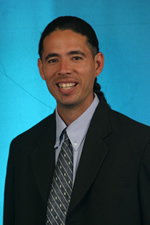Volume No. 2 Issue No. 42 - Monday June 9, 2008
The indigenous people and their place in Dominica
 Dr Emanuel Finn Dr Emanuel Finn


Claudius Sanford of the United Workers Party.
|
I did not understand what that these songs meant. Now I know that it was the entrench experience of the colonial machinery that was at work. Today our kids ought to be singing �God save the pure Carib Indians, our first nation�.
Prime Minister Roosevelt Skeritt should be applauded and congratulated for creating the first Ministry for Carib Affairs headed by a Carib.
Parliament should go one step further to enact a law that dictates that there will always be a Ministry of Carib Affairs, which must be headed by a Carib.
This new policy demonstrates a brilliant and tactical political move by the PM. It will most likely ensure that his party will be the favorite in the Reserve and more importantly, that government is very serious about addressing the conditions of the Carib people.
It is long over due and imperative that the Carib people be treated and seen as a people with a distinct heritage and rich culture and much to offer in the greater cultural and economic development of Dominica.
If democracy in Dominica is to be representative rather than just a spectacle, it must operate through a process whereby people control their destinies.
But so often behind a facade of pluralism, representative democracy in Dominica is confined to those who have political power and/or who belong to a certain socio-economic class. Invariably, it can be argued that the Caribs have been left out of true representation on the highest levels.
There should be a radio and/or TV program or a radio station that is designed by Caribs and for Caribs. The people of the eight hamlets in the north east totaling an area of land mass about 3,700 acres have to tell their story in their own authentic way.
Today we are witnessing positive trends in our politics, which include true representation of our indigenous people.
This helps our political and democratic system immensely. It means that �new� people who were not at the table can come together and make collective, public decisions about how they live and address the challenges that they face.
They will be their own spokes-people and they will be able to advocate and articulate the stories, struggles and triumphs of their own people. In so doing, the old democratic and antiquated fa�ade of bourgeois and petty partisan politics as we know it in Dominica will begin to rip away.
A new and lasting kind of democratic politics will emerge. Giving the Caribs their own ministry is the last frontier of defeating this obsolete political petty bourgeois and the old and ineffective colonial hierarchical style system.
But while ideology based petty partisan politics will continue to be well and alive in Dominica, it must be demoted in its current destructive forms and styles. Political change, thinking and reform in Dominica today must carve out more space for innovativeness and progressive trends in every aspect of society.
During Dame Charles and the Dominica Freedom Party administration first term in office, the Caribs articulated the conceptual and organizational key to real democracy quite clearly: full autonomy.
While the concept of autonomy of the Carib Reserve frightened the government and country with thoughts of an independent community within Dominica, this writer thought otherwise.
Given the history and culture of the Caribs, this was not so much a far fetch idea. The way to organize autonomy can vary widely without causing any alarm, apprehension or division.
The autonomy of special communities of ethnic groups of special regions (e.g. Carib Reserve) is the only possible basis for true pluralism. One that is truly democratic.
Autonomy does not necessary mean the abolition of politics, democracy or the fragmentation of societies. Politics is an inescapable element of human social life.
The politics of autonomy simply refuses the structuring of this dynamic through the imposition of a persuasive set of accepted (old-fashion) rules of value, habit and behavior.
Instead, autonomy celebrates a vision of endless dialogue and interaction within an ever-changing community of communities, both locally and on a world scale.
Today the indigenous and political Carib leadership including the Carib Chief, Honorable Kelly Graneau, UWP candidate Claudius Sanford, Medical Doctor Sanford and others, have placed community autonomy high on their agenda.
This concept is also at the center of the development of democratic practices and the renewal of community consciousness and identity.
Indigenous autonomy goes well beyond simple economic self -determination. It includes social, legal and political community autonomy.
This notion of autonomy recognizes local and ethnic differences and is not based on a notion of rights, partition of country, needs, culture and desires. Instead, it is based on a plurality of political, economic and cultural systems.
The conception of autonomy and full recognition for the Carib people shows that we allow and care for truly democratic practices in Dominica that accept and foster differences, dialogue and harmony among our people and country. The Carib territory, people and vote can no longer be taken for granted.
Return to previous page
 E-mail to a friend E-mail to a friend

|
|





